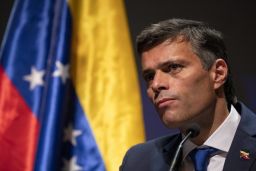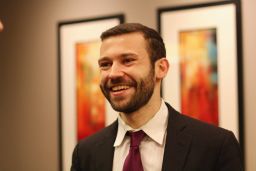Editor’s Note: Leopoldo López is a Venezuelan politician, opposition leader who was imprisoned on charges of inciting anti-government protests and Renew Democracy Initiative freedom fellow. Uriel Epshtein is the executive director of the Renew Democracy Initiative. The views expressed in this commentary are their own. View more opinion on CNN.
On Thursday, President Joe Biden opens his Summit for Democracy, gathering representatives from over 100 countries to “galvanize commitments and initiatives across three principal themes: defending against authoritarianism, fighting corruption, and promoting respect for human rights.”

There’s only one problem. Even if the group can come up with workable recommendations, there is currently no good mechanism that would allow international democracies to work together to achieve them. To fulfill its promise, Biden’s summit should not only showcase bold ideas to promote freedom, but also begin to create a clear system for implementation.

The United Nations, whose charter reaffirms “faith in fundamental human rights,” is not the best global body to promote these democratic ideas. In reality, it was designed to de-escalate tensions and avert further world wars. Simply put, it was not built in a way that would easily promote freedom or constrain authoritarianism. And though its peacekeeping missions do make a positive difference, they are limited in scope and frequently face objections from authoritarian member states.
In fact, authoritarian regimes are often able to hijack these sorts of international institutions – and the very language of freedom – in order to further entrench their power. The UN Human Rights Council, for example, a body that is ostensibly meant to ensure the “promotion and protection of all human rights around the globe,” includes China, Cuba, Russia and Venezuela among its members.
Needless to say, human rights are unlikely to rank particularly high on the priority list of countries which allegedly poison opposition figures, imprison political opponents or attempt genocide. And while each of these countries have vehemently denied these allegations, there is no doubt that they are actively working against democracy.
In short, what’s missing is an international body that easily enables democracies to work together. The late US Sen. John McCain of Arizona once called for a League of Democracies, which could “form the core of an international order of peace based on freedom,” acting “where the UN fails to act.”
If we accept, as Biden does, that the defining battle of our time is democracy versus autocracy, it is far past time to heed McCain’s call. There are many organizational forms that this group could take, but the most important thing is that it be comprised of only those countries that are genuinely (if imperfectly) democratic – and those striving to be. There will be plenty of controversy over who should be included, but even moderate adherence to this criterion would ensure that there is at least one international body that dictators cannot hijack for their own ends.
Whatever form it takes, this organization should focus on achieving four goals.
First, it should improve international coordination among free nations so that democracies can respond to challenges immediately, decisively and meaningfully. Whether this involves sanctioning bad actors, supporting struggling democracies or condemning human rights violations, we need to enable free nations to work together without being thwarted by opposition from authoritarian states.
Second, it should support international corporations that come under pressure from dictatorships. Though we should expect more companies to behave like the Women’s Tennis Association did when one of its players disappeared from the public eye, the reality is that companies (even wealthy, powerful ones like the NBA) are unlikely to resist authoritarian pressure. They are primarily profit-making machines ill-positioned to respond to authoritarian countries leveraging their might and money to bring the companies to heel.
Third, it should combat the disinformation and propaganda emanating from authoritarian regimes. There’s a certain irony in how dictators use social media technologies developed in the free world to undermine it. We need to respond by creating common rules for social media companies where free speech is respected, but disinformation is no longer endlessly amplified.
But with free nations now beset with authoritarian challengers and faith in democracy plummeting around the world, the most important thing we can do is create a common, compelling narrative in defense of freedom and pluralism.
And there is historical precedent for it. Voice of America, originally created to counter Nazi propaganda, ultimately ended up representing American values in countries and especially in dissident communities around the world. Today, democratic countries should come together and create a version of Voice of America that isn’t dedicated to any one single country, but to the very concept of democracy.
Make no mistake – the challenge we face is significant. While leaders of free countries have to worry about separation of powers, legal scrutiny from independent judiciaries and achieving some form of consensus, dictators are blessed with freedom from such constraints. They can attack opponents and stifle dissenters quickly and without worrying about pesky things like laws, opposition parties or even binding international treaties. Just as importantly, dictators’ control over unimaginable wealth enables them to corrupt institutions and individuals far outside their borders.
But as the democracy summit begins, there is some reason for hope. Biden’s decision to implement a diplomatic boycott of the Beijing Olympics, his clear-eyed assessment of Russian President Vladimir Putin as a “killer,” and his willingness to consider enacting new sanctions on Putin’s inner circle all point to an understanding that democracies must forcefully stand up for their ideals if they are to overcome authoritarianism. We hope that during and after the summit, in addition to standing up, democracies choose to stand together in defense of the values that make freedom possible.


